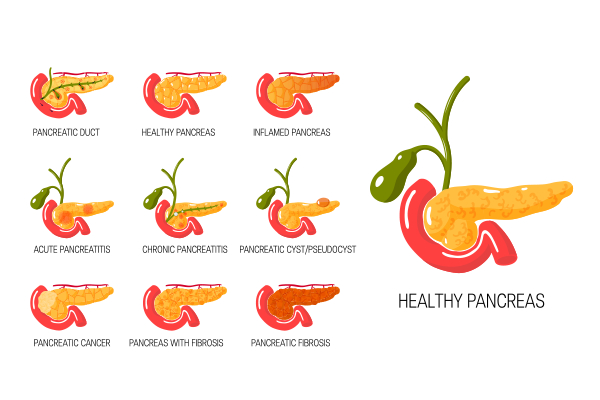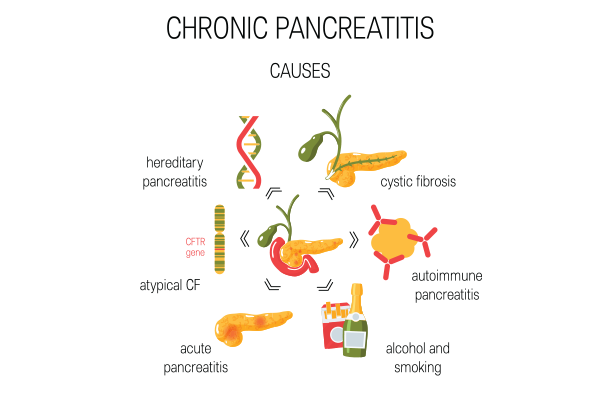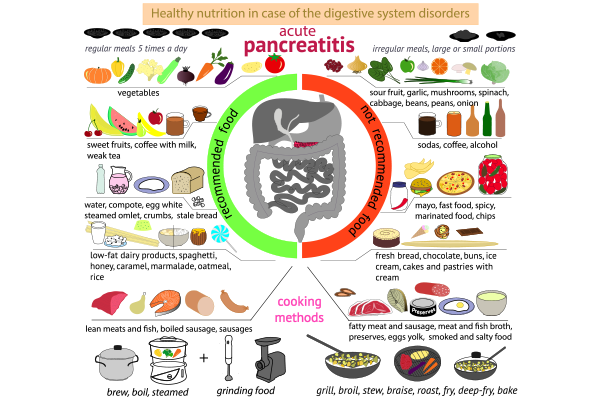
Chronic pancreatitis is a long-term inflammatory condition of the pancreas that affects digestion and overall health. Unlike acute pancreatitis, which develops suddenly and can resolve, chronic pancreatitis is a progressive disease that leads to permanent damage to the pancreas. This article explores the chronic pancreatitis causes, of chronic pancreatitis symptoms, treatment options, and lifestyle management strategies for chronic pancreatitis.
Synopsis
Understanding Chronic Pancreatitis
The pancreas is a vital organ responsible for producing digestive enzymes and insulin. When inflamed repeatedly, it can suffer irreversible damage, leading to chronic pancreatitis. This condition affects the body's ability to digest food and regulate blood sugar levels, increasing the risk of malnutrition and diabetes.
Causes of Chronic Pancreatitis
Several factors contribute to chronic pancreatitis, with alcohol abuse being the most common cause. Other causes include:
-
Excessive Alcohol Consumption – Long-term heavy drinking accounts for up to 70% of chronic pancreatitis cases.
-
Genetic Factors – Some individuals inherit genetic mutations that predispose them to the disease.
-
Gallstones – Though more commonly linked to acute pancreatitis, gallstones can contribute to chronic inflammation.
-
Autoimmune Disorders – The immune system can mistakenly attack the pancreas, leading to inflammation.
-
Cystic Fibrosis – This genetic disorder affects pancreatic function and may lead to chronic pancreatitis.
-
High Triglycerides – Elevated fat levels in the blood can trigger pancreatic inflammation.
-
Smoking – Smoking significantly increases the risk of chronic pancreatitis.
-
Obstruction in the Pancreatic Duct – Conditions like tumours or strictures can block the pancreatic duct, causing inflammation.
Chronic Pancreatitis Symptoms

The chronic pancreatitis symptoms can be debilitating and worsen over time. These include:
-
Persistent Abdominal Pain – A deep, burning pain in the upper abdomen that radiates to the back.
-
Unexplained Weight Loss – Poor digestion leads to nutrient deficiencies and weight loss.
-
Greasy, Foul-Smelling Stools (Steatorrhea) – Due to insufficient enzyme production, fats are not properly digested.
-
Nausea and Vomiting – Chronic pancreatitis can lead to frequent nausea.
-
Jaundice – In some cases, bile duct obstruction causes yellowing of the skin and eyes.
-
Diabetes – Progressive damage to insulin-producing cells can result in diabetes.
|
Symptom |
Description |
|
Abdominal Pain |
Persistent upper abdominal pain radiating to the back |
|
Weight Loss |
Due to poor digestion and nutrient absorption |
|
Steatorrhea |
Fatty, greasy stools with a foul smell |
|
Nausea & Vomiting |
Frequent digestive distress |
|
Jaundice |
Yellowing of skin and eyes (in some cases) |
|
Diabetes |
High blood sugar levels due to pancreatic damage |
Chronic Pancreatitis Treatment Options

Treatment focuses on pain management, enzyme supplementation, and addressing underlying causes.
Medical Treatments
-
Pancreatic Enzyme Supplements – Help improve digestion by compensating for enzyme deficiency.
-
Pain Management – Includes prescription medications or nerve blocks for severe pain.
-
Insulin Therapy – Required if diabetes develops due to pancreatic damage.
-
Chronic Pancreatitis Surgery – In severe cases, surgical procedures like the removal of damaged tissue or pancreatic drainage can help relieve symptoms.
Lifestyle and Dietary Modifications
-
Alcohol and Smoking Cessation – Essential for slowing disease progression.
-
Low-Fat Diet – Helps prevent digestive distress and reduces pancreatic workload.
-
Frequent, Small Meals – Easier to digest and absorb nutrients.
-
Hydration – Drinking enough water supports digestion and overall health.
Consult our best gastroenterologist doctor in Delhi if you need treatment and care.
Prevention of Pancreatic Diseases
Preventing chronic pancreatitis involves lifestyle changes and early intervention:
-
Limit Alcohol Intake – Reducing alcohol consumption lowers the risk of pancreatic inflammation.
-
Maintain a Healthy Diet – A balanced diet rich in fruits, vegetables, and lean proteins supports pancreatic function.
-
Exercise Regularly – Helps maintain a healthy weight and prevents metabolic disorders.
-
Control Cholesterol and Triglyceride Levels – Prevents complications linked to high-fat levels in the blood.
-
Avoid Smoking – Reduces inflammation and lowers pancreatic cancer risk.
Pancreatic Diet and Lifestyle Management
Diet plays a crucial role in managing chronic pancreatitis and preventing flare-ups.
Recommended Foods
-
Lean Proteins – Chicken, fish, tofu, and legumes.
-
Fruits and Vegetables – Provide essential vitamins and antioxidants.
-
Whole Grains – Brown rice, oatmeal, and whole-wheat bread aid digestion.
-
Healthy Fats – Avocados, nuts, and olive oil in moderation.
Foods to Avoid
-
Fried and Fatty Foods – Strain the pancreas and worsen symptoms.
-
Processed Foods – Contain additives that can trigger inflammation.
-
Sugary Drinks and Desserts – Exacerbate diabetes risk.
-
Alcohol and Caffeine – Can trigger pancreatic pain and damage.
Conclusion
Chronic pancreatitis is a serious condition requiring long-term management. By making informed lifestyle choices, following a healthy diet, and seeking medical care, individuals can improve their quality of life and reduce complications. If you experience chronic pancreatitis symptoms, consult a healthcare provider for an accurate diagnosis and treatment plan.
For expert care and advanced treatment options, consider Manipal Hospitals Delhi, a leading name in gastroenterology and pancreatic care. Their experienced specialists provide state-of-the-art treatments to help manage chronic pancreatitis effectively and improve patients’ quality of life.
FAQ's
Some mild cases of pancreatitis can improve with early intervention, but chronic pancreatitis causes permanent damage. Managing risk factors and treatment can slow its progression.
Signs include persistent abdominal pain, unexplained weight loss, greasy stools, frequent nausea, and diabetes.
A healthy diet reduces inflammation, aids digestion, and prevents complications. Avoiding alcohol, unhealthy fats, and processed foods can protect the pancreas.
Chronic pancreatitis is a long-term condition that requires ongoing management. While symptoms can be controlled, the damage is irreversible.



















 4 Min Read
4 Min Read
















